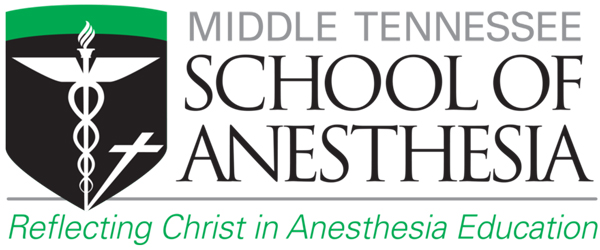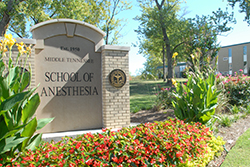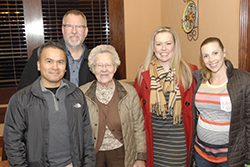MTSA Mission & Awards Gala Recognizes Achievements, Raises Funds for Haiti Mission
July - September 2016
On Thursday, May 5, MTSA hosted its third annual Mission & Awards Gala with 250 guests who gathered at the Country Music Hall of Fame and Museum in Nashville. The event raised needed funds for the School’s Mission Initiative in Haiti, and other local communities.
Local TV personality Meryll Rose, co-host of NewsChannel 5’s Talk of the Town program, served as master of ceremonies. After guests took a tour of the Museum, dinner was served and the program began.
President Chris Hulin, DNP, MBA, CRNA, started by celebrating the achievements of the anesthesia community and presenting awards to alumni, community partners and others for their dedication to MTSA.
“I am grateful for the support of each financial contributor who has helped make this evening possible as proceeds fund MTSA’s new Mission Initiative,” Hulin said. “Your help will fund an ultrasound machine for primary use of regional anesthesia, trauma care, and obstetrical screening in Haiti.”
Hulin also thanked the committee that worked to make the evening a success. They included:
- Michelle Arant, MS, CRNA (Chairman)
- Buffy Lupear, DNP, CRNA (Vice Chairman)
- Les Andrus, MS, CRNA
- Diana Bird
- Lois J. Bernard, MS, CRNA
- Kay Chamberlain, MS, CRNA
- Sherry Clem
- Catherine Cunningham
- Arlene Cooper, CRNA
- Matt Demaree, MS, CRNA
- Rhonda Hendon, MS, CRNA
- Roxanne Lenz, CRNA
- Julie Murphy, MS, CRNA
- Cristy Pennington, MS, CRNA
- Nancy Palmore, MS, CRNA
- Kim Sharkey, DNAP, CRNA
- Dina Velocci, DNP, CRNA
- Rachelle Wetmore
The Gala also featured guitarist-vocalist Tim Rushlow who offered his “One Man, One Guitar, One Night” show, an intimate musical journey through his hits as well as songs by other artists that have deep meaning to him.
Rushlow is no stranger to the stage, having grown up in a musical family, then the lead vocalist for the country supergroup Little Texas, followed by a successful solo career. He has taken the approach with his solo show that every audience member is in his living room for the night.
Event sponsors included:
- Dinner – Northstar Anesthesia
- Reception – Phy-Med Healthcare Group
- Nevin Downs, MD Leadership Award – Myrtianne Downs
- Philanthropy Award – Mollenkopf Design Group
- Mission & Heritage Award – KY-TN Conference of Seventh-day Adventists
- DeVasher Distinguished Alumni Service Award – Valley Anesthesia
- Clinical Excellence Award – Cardiovascular Anesthesiologists
Many thanks to those who attended the Gala or supported the Mission Initiative through special donations.
MTSA President's Message
What an exciting time to be at MTSA! With one year under my belt as President, I find myself humbled every day by the dedication of the faculty, staff, students and alumni of this extraordinary institution. We have much to be proud of – and much to look forward to in the coming months.
Take a moment with me as we reflect on here we’ve been and where we’re going.
Leadership in Acute Surgical Pain Management
The headlines continue to shine a spotlight on the opioid epidemic in the United States. According to the Centers for Disease Control and Prevention, more than 165,000 people have died in the U.S. between 1999 and 2014 from overdoses related to prescription opioids. And in 2014 alone, more than 14,000 people died from overdoses. That’s nearly 40 people per day who fall victim to these powerful drugs.
There’s plenty of blame to go around in terms of who’s responsible, but the focus should be on solutions. Our efforts toward educating nurse anesthetists in Acute Surgical Pain Management (ASPM) and ultrasound-guided regional anesthesia (USGRA) have been on the leading edge of the field. We started two years ago by introducing the Center of Excellence with Halyard Health (formerly Kimberly-Clark Health Care) and are continuing to build upon this success and partnering with other familiar names in the anesthesia industry.
Earlier this year, we issued a news release that outlined our approach to the problem. We promoted USGRA as an intervention that makes acute surgical pain management safer, more effective and a viable option for a broader range of regional anesthetic procedures than ever before. The challenge is that not enough CRNAs have had this advanced training and are able to offer ASPM as part of their anesthetic plan. MTSA is trying to change this by providing the education needed to make it more readily available in all types of clinical settings.
The media has responded favorably to our efforts, and we continue to promote the fact that regional anesthesia is a game-changing option in the patient’s surgical experience, and that CRNAs are part of the solution in the fight against opioid abuse. Stay tuned for a major announcement later this year related to acute surgical pain management in which MTSA will take the lead on a new national initiative in this arena.
The Good, The Bad & The Ugly: ‘Professional Behavior’ in Nurse Anesthesia
A Review of DNAP Graduate Rusty Gentry’s Capstone Project
Gentry’s Capstone project—titled The Professional Mini Evaluation (P-MEX): A Survey to Evaluate Clinical Educators Beliefs of Tool Effectiveness as a Clinical Professional Behavior Assessment of Student Nurse Anesthetists—addressed an issue many years in the making: the nurse anesthesia field doesn’t have effective guidelines for unprofessional behavior, and that could have dire effects on the industry.
“The literature shows that we have a problem with professional behavior,” Gentry said. He added, it started gradually but reached a fever pitch in recent years. “There’s a social contract with society when you participate in healthcare that says, ‘I’m putting the patient’s welfare ahead of my own.’ But healthcare as a business has eroded that contract. Before, people went into nursing or a health-related field because they wanted to help others. Now people often go into certain fields because they want to gain financially, which has had a deteriorating effect on professional behavior.”








